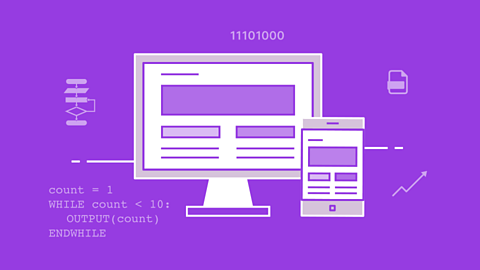Exam practice
GCSE Computer Science: Exam-style quiz by topic
Try this quiz based on GCSE Computer Science past papers. Choose the topic you would like to revise and answer the questions.

GCSE Computer Science: exam-style questions
Get ready for your Edexcel computer science GCSE exams with free interactive tests and feedback to improve your knowledge of binary, programming techniques and more.

GCSE Computer Science: quick-fire questions
Free interactive Edexcel computer science GCSE questions based on past papers. Boost your knowledge of algorithms, computer systems, data structures and more.

Principles of computer science
Decomposition and abstraction - Edexcel
Decomposition is a crucial step for an algorithm to be designed effectively. Once a problem is broken down into smaller steps, it can then be understood much easier, rather than attempting to solve it as a whole.

Algorithms - Edexcel
Algorithms are step-by-step plans for solving problems. Algorithms can be designed using pseudo-code, flowcharts, written descriptions and program code. There are also some standard algorithms for searching and sorting.

Further algorithms - Edexcel
Programs must run correctly or they are of little value. The careful planning and testing of a program is essential, as is writing code which assists future updating.

Truth tables - Edexcel
Computers are collections of transistors and circuits. These connect together to form logic gates, which in turn are used to form logic circuits. These can be represented as truth tables, Boolean algebra logic statements, and diagrams.

Binary and data representation - Edexcel
All data in a computer is represented in binary, whether it is numbers, text, images or sound. The computer software processes the data according to its content.

Computers - Edexcel
The CPU is the part of a computer system that runs programs and processes data. CPUs use the fetch-decode-execute cycle to do this. The CPU is an internal component of the computer hardware. Operating systems and utilities are programs used to manage and maintain the computer system.

Programming languages - Edexcel
Programming languages are classified as high-level or low-level languages. Translators are needed to translate programs into the machine code that a computer understands. Different languages are more suitable for different tasks.

Networks - Edexcel
A network is when more than one device is connected in order to communicate. There are different types of networks which are used for different purposes.

Network security and cybersecurity - Edexcel
Networks operate on the principles of communication and sharing. That means network traffic and data could be accessed by people who have no authority to do so. Enhanced security measures can help to prevent cyberattacks.

Encryption - Edexcel
The information stored and sent using computers can be sensitive. Encryption is used to ensure that data can be stored and messages can be sent securely over a network.

Environmental, ethical and legal concerns - Edexcel
The use of computers has brought about environmental, ethical and legal issues and concerns. These increasingly affect people's daily lives.

Application of computational thinking
Develop code - Edexcel
Programs must run correctly or they are of little value. The careful planning and testing of a program is essential, as is writing maintainable code which assists future updating.

Programming constructs - Edexcel
Programs are designed and implemented using common building blocks, known as programming constructs. These constructs are sequence, selection and iteration and they form the basis for all programs.

Data types, structures and operators - Edexcel
Programs use data, known as ‘values’. Variables hold values. Each variable in a program must have a data type. Sometimes a programmer needs to store a lot of related data. To do this they use structures such as arrays.

Study skills
Decomposition and algorithm practice questions - Edexcel
Pseudocode questions need to be analysed and decomposed before writing an answer. The question may give hints about possible program structures to use. You do not need to memorise pseudocode, and errors are acceptable as long as the meaning is clear.

How to tackle essay-style questions - Edexcel
Essay-style questions are worth a lot of marks. They test not only your technical knowledge and understanding, but whether or not this can be put into a coherent argument.

Links
- External linkExternal link
- External linkExternal link
- External linkExternal link
- External linkExternal link
- External linkExternal link
- SubscriptionSubscription